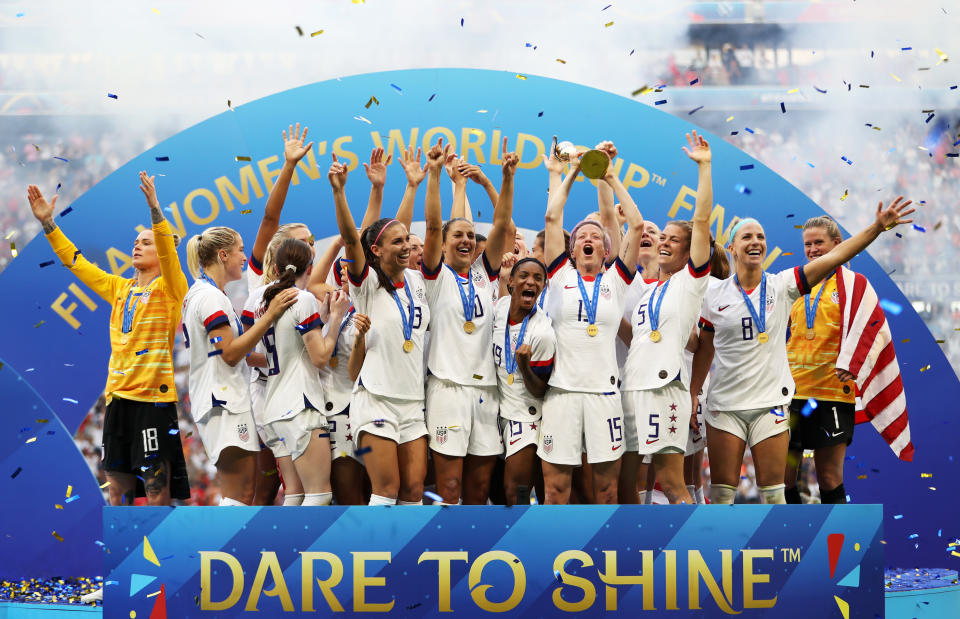The U.S. women's national team won all of its battles in 2019, on the field and off

There’s a kind of high-wire balancing act that the United States women’s national team pulls off with such an effortless grace that it’s hard to even realize it’s there.
There’s the soccer piece, of course. And the semi-perfunctory inspiring-all-the-little-girls-out-there piece. That’s the obvious part of the national team’s remit. It’s winning World Cups and winning hearts and minds. It’s being the perfect role models and taking selfies and signing merchandise and being charming and composed in interviews, because there still isn’t any tolerance for high-profile female athletes acting anything but perfectly – unlike their male counterparts, of whom an awful lot more is accepted.
The national team, plainly, is very good at all of that. They have four World Cup trophies and four Olympic gold medals to make the case on their behalf. To say nothing of their status as the most popular national team in their country – probably the only nation in the world where the men live in the shadow of the women when it comes to mainstream popularity and consciousness.
If you’ve spent any time at all around the national team, you’ve heard the cacophony of shrieks, heard the platitudes about future generations, seen the army of girls wearing pink hairbands and ponytails, spotted the infinite Alex Morgan jerseys.
But the U.S. women have somehow managed to maintain that immaculate image – and kept themselves up high on the impossible perch of being aspirational and inspirational in a camera-phone age when there’s absolutely no hiding things anymore – while fighting fiercely away from the field.
That’s what made 2019 such a remarkable year for the American women.
Their opening game of the year was lost to France 3-1, and they were sluggish in the SheBelieves Cup, drawing twice and winning only once. But after that lone loss, the USA went undefeated the rest of the year, compiling a 20-1-3 record, including seven straight victories at the World Cup, claiming a second consecutive global crown.
But all the while, the American women fought on other fronts as well, away from the field.

At the start of the year, they fought the impression that they were regressing. Yet more experimentation from head coach Jill Ellis – who had so unnerved the team with all of the changes she made that several veterans reportedly pushed for her ouster back in 2017 – and a lone win from those first four games begged difficult questions at the beginning of a World Cup year.
At the World Cup, they fought the president of the United States, as a months-old throwaway comment from star forward and co-captain Megan Rapinoe – that she wouldn’t be “going to the f---ing White House” if the team won the World Cup – caught fire. The president, predictably, seized the opportunity to get into a heated exchange. And while the fight was more Rapinoe’s than her team’s, her peers supported her, whether explicitly or implicitly and indicated, in less assertive ways, that they stood by her and mostly felt the same way. And then they delivered the big trophy.
And then, above all, the team fought for equal pay in a well-publicized battle in the much larger war for women’s rights. For years now, the women’s national team has argued that it is doing the same work, for the same employer, as the men’s national team is doing — yet it is paid less. Negotiations with U.S. Soccer have resulted only in an improved collective bargaining agreement, rather than in absolute equal pay. The federation has argued that the women have a different pay structure. And it says that the team rejected an offer to give up its guaranteed money and benefits to work under the same, high-risk, high-reward all-bonus arrangement as the men – which fails to address that men’s players also have sizable contracts and generous benefits with their club teams, while the women don’t. It also says that, in some years, a few female players have made more than the top-earning men. The women counter that they had to play and win a lot more games and trophies to get to an equal paycheck than the men did and that any such arithmetic rests on a false equivalency.
In 2019, the American women proceeded with a gender discrimination lawsuit against U.S. Soccer, while a federal complaint with the Equal Employment Opportunity Commission is ongoing. Just last month, the women won the right for class-action status in their case, suggesting that the judge in question was at the very least sympathetic to their arguments, and hostile to U.S. Soccer’s total-paycheck defense.
And it kept up that fight, all of those fights, without the results on the field suffering any. No matter what went on away from the pitch, the women’s national team was beyond reproach in their very visible responsibilities as public figures.
They made it look easy, in fact, the whole business of winning a World Cup and winning battles in the fight for gender equality.
Leander Schaerlaeckens is a Yahoo Sports soccer columnist and a sports communication lecturer at Marist College. Follow him on Twitter @LeanderAlphabet.
More from Yahoo Sports:


